 Review by Jessica Manack
Review by Jessica Manack
Kari Gunter-Seymour, whose term as Poet Laureate of Ohio was just extended by Governor Mike DeWine, is a people’s poet. She writes of her people, for her people, and spearheads the collection of regional voices into anthologies like Women Speak, a project celebrating its 15th anniversary this year.
A modern-day Joanie Appleseed, Gunter-Seymour collects poems and carries them to poemless places, carefully situating them in spaces where they can flourish. In the new collection Dirt Songs, the latest collection in her own growing body of work, she takes a deep dive into the secrets of the soil, unearthing buried memories and the histories of those who have come before her.
Rich with the particular vernacular of her terrain – “Amesville Girls…Say words like warsh/and fixin’ to go…” (17) – she shares how origin stories were passed down, as in “Our Grandmother,” who “drew us maps where we came from, patchworks of bloodroot, furled fierce along the face of the Appalachians…” (21)
A strong sense of place anchors the poems in this collection, as in “Spring in the Hollow,” when she muses, “Breeze…reminds us this ground we tramp, root labyrinth, rising and setting inside our shoes, is remedy… Any flaw our bodies carry from otherwhere disappears – “ (28)
Gunter-Seymour recalls the romps and joyrides of youth in assembling this patchwork quilt of a life, the gruff plaids and dancing calicos existing in harmony. Moments of pleasure are remembered, in both reverent and regretful detail. Artfully melding pop culture references with timeless truths, she conveys a rootedness in the earth: “Beneath damp pines she plucks/needles and licorice root to soothe a scratchy throat, stiff knuckles loosen white oak bark for fever, a pinch of wormwood to calm the nerves.” (33)
One of Gunter-Seymour’s earlier poems is titled “I come from a place in America so deep it can’t be seen.” Indeed, her aim is to serve as chronicler of this place she’s from – not only physically, but mentally – in a way that it won’t evade acknowledgement any longer, won’t be confined to shadows – even if that shines a light on the parts that sting to remember.
In a place where one must try hard to evade the “Family Curse” of substance abuse, finding the praisable in the landscape provides positive forward momentum. “Pawpaws Are Ripe” is an ode to this regional delicacy:
I smile at all the ways
my people have come to preserve
this delicate fruit, one of the few treasures
of this ridge not yet stripped or clear cut…
sown centuries ago
by Shawnee, Delaware and Mingo. (55)
Enjoyment of the sweet fruit is tempered by recollection of those who tended the land before us, before it was seized by Europeans. Likewise, in “Sweet Corn and Watermelon,” she observes: “These fields, now wedged in pre-fab/and cul-de-sac, your great-great plowed/and seeded by mule, scythe and hoe.” (56)
It is hard work, this unearthing – acknowledging what had long been buried – and the telling takes its toll: “She’s had a good cry, one that could/have left a lesser woman sharp-cornered” (51). Flipping over the stones of one’s origins is something one must steel oneself to do: “Turns out the danger in the writing/is you will remember all you’ve worked so hard to erase.” (38) The book is rich with reflection – in the final poem, the speaker pauses to wonder if she would live this life over again.
Dirt is where all our songs are born – where we are born. Gunter-Seymour writes of messages from one’s forebears received in signs and symbols, in dreams, and messages from birds. While the landscapes of Southeastern Ohio and environs provide the setting of many of these poems, the universality of the lived experience of wives, sisters, daughters and mothers will resonate with readers from all corners. In these poems, I saw people I’ve been, and people I might have been, if I had chosen a different path. When we’re open to what the land around us is saying, we can better understand our origins – and our selves.
Dirt Songs by Kari Gunter-Seymour
EastOver Press, 2024, paper
ISBN 978-1-958094-35-8
Jessica Manack holds degrees from Hollins University and lives with her family in
Pittsburgh, Pennsylvania. Her writing has recently appeared in Maudlin House, Still: the Journal and Litro Magazine. She is a recipient of a 2022 Curious Creators Grant. Keep up with her work at http://www.jessicamanack.com
